US labour market – maybe at a turning level with unemployment rising – William Mitchell – Trendy Financial Concept
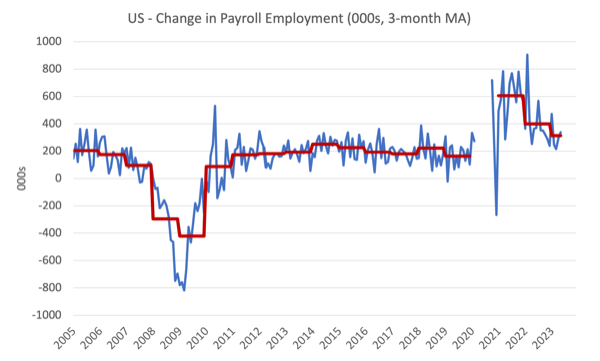
[ad_1]
Final Friday (June 2, 2023), the US Bureau of Labor Statistics (BLS) launched their newest labour market information – Employment State of affairs Abstract – Could 2023 – which revealed that the the US labour market could also be at a turning level however is actually not contracting at a charge according to an imminent recession. There was a seamless weakening of web employment development, despite the fact that the payroll and survey information had been in battle. The speed of decline although, is presently according to an imminent recession. We are going to see within the June figures whether or not the slowdown has develop into a pattern.
Overview for Could 2023 (seasonally adjusted):
- Payroll employment elevated by 339,000 – barely up on previous few months.
- Whole labour pressure survey employment fell by 310 thousand web (-0.19 per cent) – a major weakening following final month’s slower consequence.
- The labour pressure rose 130 thousand web (0.08 per cent).
- The participation charge was unchanged at 62.6 per cent.
- Whole measured unemployment rose by 440 thousand to six,087 thousand.
- The official unemployment charge rose by 0.3 factors to three.7 per cent.
- The broad labour underutilisation measure (U6) rose 0.1 level to six.7 per cent.
- The employment-population ratio fell 0.1 level to 60.3 per cent (nonetheless nicely under the Could 2020 peak of 61.2).
For many who are confused concerning the distinction between the payroll (institution) information and the family survey information it is best to learn this weblog put up – US labour market is in a deplorable state – the place I clarify the variations intimately.
Some months the distinction is small, whereas different months, the distinction is bigger.
Payroll employment developments
The BLS famous that:
Whole nonfarm payroll employment elevated by 339,000 in Could, in keeping with the common month-to-month achieve of 341,000 over the prior 12 months. In Could, job
beneficial properties occurred in skilled and enterprise companies, authorities, well being care, development, transportation and warehousing, and social help …In Could, skilled and enterprise companies added 64,000 jobs, following a rise of comparable measurement in April …
Authorities employment elevated by 56,000 in Could, in contrast with the common month-to-month achieve of 42,000 over the prior 12 months. Employment in authorities
is under its pre-pandemic February 2020 degree by 209,000, or 0.9 p.c.Well being care added 52,000 jobs in Could, much like the common month-to-month achieve of fifty,000 over the prior 12 months …
Employment in leisure and hospitality continued to pattern up in Could (+48,000) … stays under its February 2020 degree by 349,000, or 2.1 p.c.
In Could, development added 25,000 jobs … Over the prior 12 months, development had added a median of 17,000 jobs monthly.
Employment in transportation and warehousing elevated by 24,000 in Could … Employment in transportation and warehousing has proven no clear pattern in latest months.
In Could, employment in social help rose by 22,000, in keeping with the common month-to-month achieve of 23,000 over the prior 12 months …
Employment was little modified over the month in different main industries …
In abstract, no signal of an impending recession though common month-to-month job creation in web phrases is nicely down on 2022.
The primary graph reveals the month-to-month change in payroll employment (in hundreds, expressed as a 3-month transferring common to take out the month-to-month noise). The purple traces are the annual averages. Observations between January 2020 and January 2020 had been excluded as outliers.
Some sectors, nonetheless, have nonetheless not regained the employment they misplaced in 2020-21.

The following graph reveals the identical information otherwise – on this case the graph reveals the common web month-to-month change in payroll employment (precise) for the calendar years from 2005 to 2023.
The purple marker on the column is the present month’s consequence.
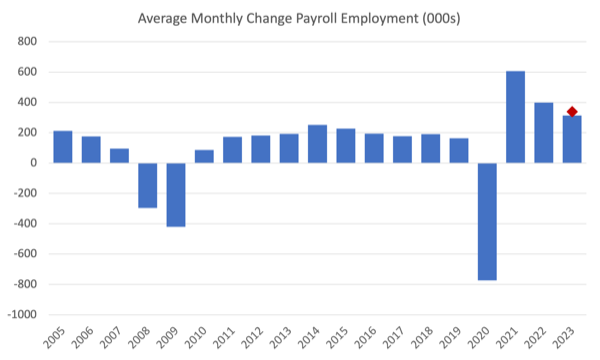
Common month-to-month change – 2019-2023 (000s)
| 12 months | Common Month-to-month Employment Change (000s) |
| 2019 | 163 |
| 2020 | -774 |
| 2021 | 606 |
| 2022 | 399 |
| 2023 (to date) | 314 |
Labour Pressure Survey information – employment contracts
This month we see a major discrepancy between the payroll information and the information obtained from the family (labour pressure) survey. See the hyperlink above if you wish to perceive why this discrepancy arises.
The seasonally-adjusted information for Could 2023 reveals:
1. Whole labour pressure survey employment fell by 310 thousand web (-0.19 per cent) – a major weakening following final month’s slower consequence.
2. The labour pressure rose 130 thousand web (0.08 per cent).
3.The participation charge was unchanged at 62.6 per cent.
4. Consequently (in accounting phrases), complete measured unemployment rose by 440 thousand to six,087 thousand and the official unemployment charge rose by 0.3 factors to three.7 per cent.
Making an attempt to reconcile the payroll and labour survey information this month is tough however the total message is that the US labour market is dropping steam however not at such a velocity that we’d count on a recession but.
The next graph reveals the month-to-month employment development since January 2008 and excludes the intense observations (outliers) between Could 2020 and January 2020, which distort the present interval relative to the pre-pandemic interval.
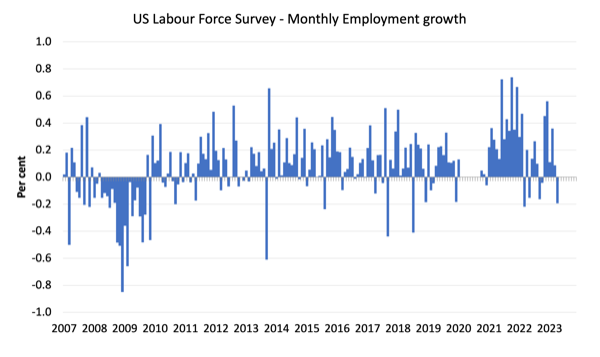
The Employment-Inhabitants ratio is an efficient measure of the energy of the labour market as a result of the actions are comparatively unambiguous as a result of the denominator inhabitants isn’t notably delicate to the cycle (not like the labour pressure).
The next graph reveals the US Employment-Inhabitants from January 1950 to Could 2023.
In Could 2023, the ratio fell by 0.1 level to 60.3 per cent – a modest weakening.
The height degree in Could 2020 earlier than the pandemic was 61.1 per cent.
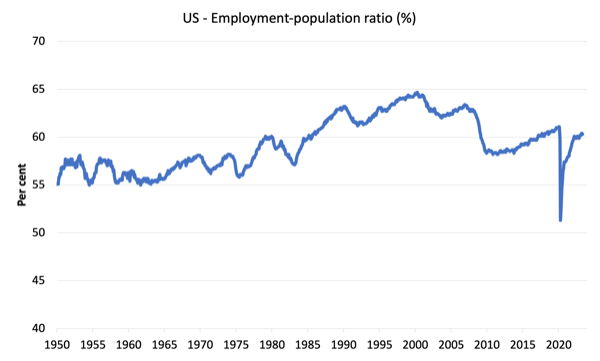
Unemployment and underutilisation developments
The BLS word that:
The unemployment charge elevated by 0.3 proportion level to three.7 p.c in Could, and the variety of unemployed individuals rose by 440,000 to six.1 million. The unemployment charge has ranged from 3.4 p.c to three.7 p.c since March 2022 …
The variety of long-term unemployed (these jobless for 27 weeks or extra) was basically unchanged at 1.2 million and accounted for 19.8 p.c of the whole unemployed …
The variety of individuals employed half time for financial causes, at 3.7 million, modified little in Could. These people, who would have most popular full-time employment, had been working half time as a result of their hours had been decreased or they had been unable to search out full-time jobs.
So this month the US labour market shifted from a reasonably static image over the previous few months to a slight weakening. We are going to see subsequent month if a deteriorating pattern has set in.
The primary graph reveals the official unemployment charge since January 1994.
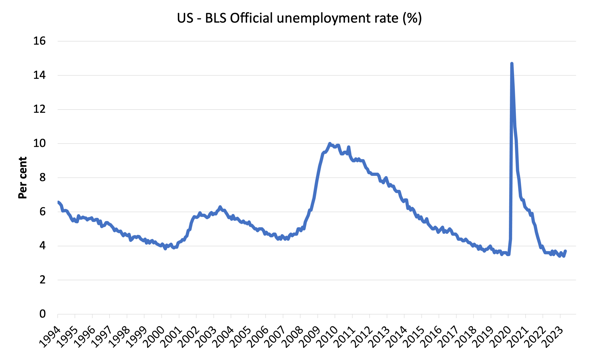
The official unemployment charge is a slender measure of labour wastage, which implies that a strict comparability with the Sixties, for instance, when it comes to how tight the labour market, has to consider broader measures of labour underutilisation.
The following graph reveals the BLS measure U6, which is outlined as:
Whole unemployed, plus all marginally connected staff plus complete employed half time for financial causes, as a p.c of all civilian labor pressure plus all marginally connected staff.
It’s thus the broadest quantitative measure of labour underutilisation that the BLS publish.
Pre-COVID, U6 was at 6.8 per cent (January 2019).
In Could 2023 the U6 measure was 6.7 per cent, up by 0.1 level because of the rise in unemployment with different figuring out components largely unchanged. It’s nonetheless 0.2 factors above the December 2022 degree.
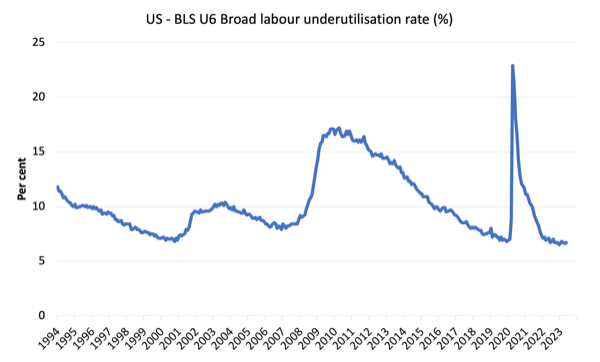
What about wages development within the US?
The BLS reported that:
In Could, common hourly earnings for all workers on personal nonfarm payrolls rose by 11 cents, or 0.3 p.c, to $33.44. Over the previous 12 months, common hourly earnings have elevated by 4.3 p.c. In Could, common hourly earnings of private-sector manufacturing and nonsupervisory workers rose by 13 cents, or 0.5 p.c, to $28.75.
The most recent – BLS Actual Earnings Abstract – April 2023 (revealed Could 10, 2023) – tells us that:
Actual common hourly earnings for all workers elevated 0.1 p.c from March to April, seasonally adjusted … This consequence stems from a rise of 0.5 p.c in common hourly earnings mixed with a rise of 0.4 p.c within the Shopper Worth Index for All City Customers (CPI-U).
Actual common hourly earnings decreased 0.5 p.c, seasonally adjusted, from April 2022 to April 2023. The change in actual common hourly earnings mixed with a lower of 0.6 p.c within the common workweek resulted in a 1.1-percent lower in actual common weekly earnings over this era.
General, the inflationary pressures are moderating quick, and nominal wages development is beginning to ship modest actual wage will increase. signal
The next desk reveals the actions in nominal Common Hourly Earnings (AHE) by sector and the inflation-adjusted AHE by sector for Could 2023 (word we’re adjusting utilizing the February CPI – the newest accessible).
Word that for personal workers, actual common hourly earnings proceed to say no on a month-to-month foundation.
There may be additionally appreciable disparity throughout the sectors, with modest actual wage will increase beginning to present in in most industries within the final month.
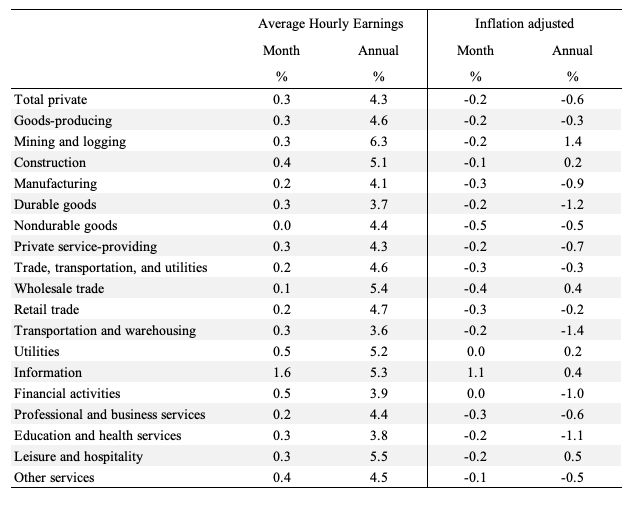
The next graph reveals annual development in actual common hourly earnings from 2008 to Could 2023.
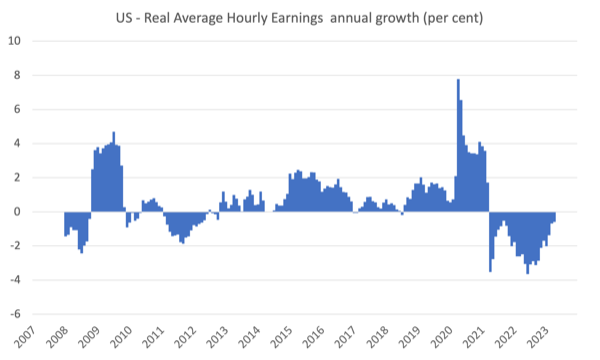
The true wage cuts have slowed and hopefully, staff will begin having fun with sustained actual wage beneficial properties.
The opposite indicator that tells us whether or not the labour market is popping in favour of staff is the stop charge.
The latest BLS information – Job Openings and Labor Turnover Abstract (launched Could 4, 2023) – reveals that:
The variety of job openings edged as much as 10.1 million on the final enterprise day of April … Over the month, the variety of hires modified little at 6.1 million. Whole separations decreased to five.7 million. Inside separations, quits (3.8 million) modified little, whereas layoffs and discharges (1.6 million) decreased …
In April, the quantity and charge of quits modified little at 3.8 million and a pair of.4 p.c, respectively.
In order of April 2023, the stop charge was not but in retreat. We are going to see if the Could 2023 information signifies a slowdown is changing into entrenched.
Conclusion
In Could 2023, the newest US labour market information revealed no indicators of a looming recession though there was a seamless weakening of web employment development, despite the fact that the payroll and survey information had been in battle.
General, the US labour market could also be at a turning level however is actually not contracting at a charge according to an imminent recession.
We are going to see within the June figures whether or not the slowdown has develop into a pattern.
That’s sufficient for in the present day!
(c) Copyright 2023 William Mitchell. All Rights Reserved.
[ad_2]



